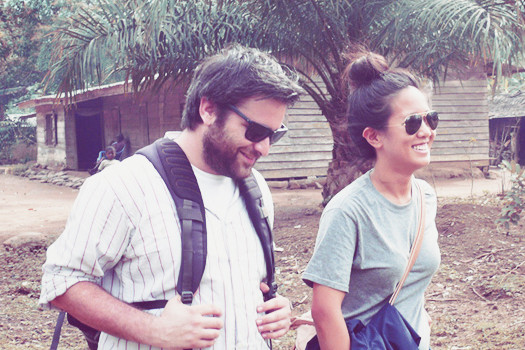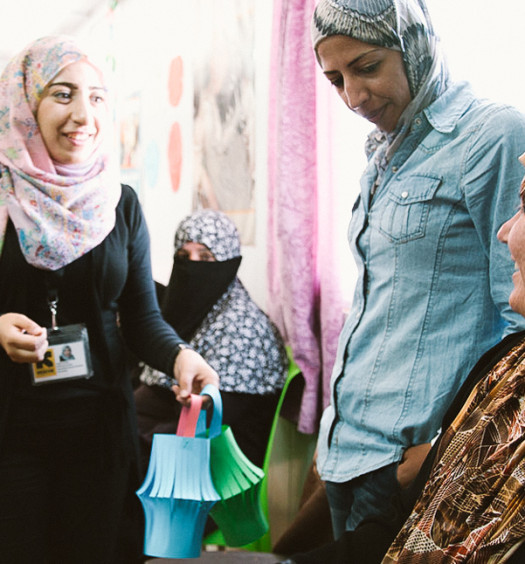The Little Market: Fashion That Empowers Women Artisans // Interview with Hannah Skvarla
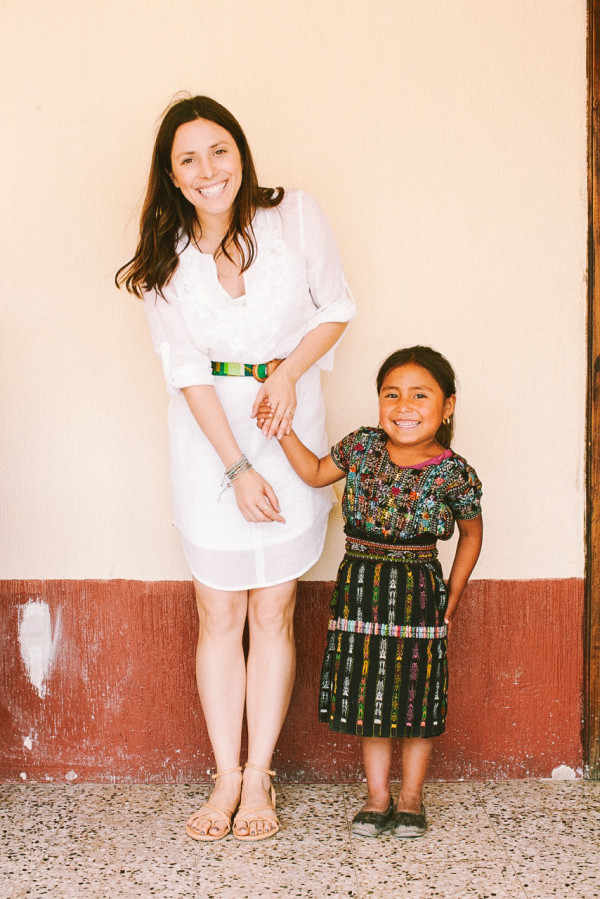
Photos courtesy of The Little Market
Want to know what I love most about a fashion brand? The people behind it. It was in a phone call with Hannah Skvarla, co-founder of The Little Market, where I learned that social justice and giving a voice for those struggling worldwide was at the forefront of her business. Together, Hannah and her partner / co-founder, Lauren Conrad, created a purposeful fashion and lifestyle brand that aims to empower women artisans to rise above poverty and support their families. From lifestyle goods to scarves, accessories, and bags for her, him, and the little ones, The Little Market introduces us to the unique treasures discovered throughout the world representing various cultures and talent. All of this is done through the building of sustainable partnerships with artisans, and by doing just that, they are building a bridge between the phenomenal talent found in rural areas of developing countries to the global marketplace.
Inspired? I am! This is why Hannah was the next person on my list to get to know and learn from. Hannah has traveled extensively throughout the developing world, and has touched many lives in Bolivia, India, Mexico, Morocco, Nepal, and Peru. Beyond the walls of The Little Market, Hannah is a member of Human Rights Watch’s (HRW) California Committee South’s Executive Committee, Women’s Rights Committee, and the co-chair of the Los Angeles Network Steering Committee.
Hello Hannah! Let’s have a conversation.
Q | Tell us about yourself?
Social justice has always been a very important part of my life: giving back through volunteering with organizations, learning about rights issues, and directly serving those in need. At the Fashion Institute of Design & Merchandising (FIDM), I learned about developing a concept and a business strategy to reach a target audience in a global marketplace. Through the Public Relations major at Chapman University, I studied the power of storytelling to convey a message. As an intern at Human Rights Watch (HRW), I discovered the commitment of the organization’s 400 journalists, researchers and attorneys in providing a voice for those struggling worldwide. That initial experience and my ongoing commitments to HRW have made me very grateful for all of the opportunities that I have had and left me moved to work for the rights of those without a voice.
Q | What sparked the vision behind The Little Market?
Lauren and I met at FIDM and discovered our shared love of design, travel, and women’s empowerment. On our travels we always visited local markets, from Bali to Tanzania, finding exquisite handmade works and meeting the artisans who created them. We realized that women with extraordinary skills that had been passed down generation to generation were struggling to support their families. Without access to a global marketplace they were not receiving living wages for their handmade objects. Living in remote regions or rural areas of developing countries, without the infrastructure to attract tourists or to ship their goods abroad, they could not reach the customers who would admire and treasure their work. We consulted with experts in International Development on the most sustainable approach to establishing on online store to support artisans from around the world. We created The Little Market to give these women a place to sell their work at prices that allow them to provide their families with food, shelter, education and healthcare.
Q | Tell us about the purpose behind The Little Market?
The Little Market is an online marketplace that works with artisan groups in struggling communities around the world who meet our fair trade, fair wages, and fair workplace standards. The artisans create one-of-a-kind goods, we offer design insights, and customers allow the artisans to reach a global market. Each purchase makes it possible for the artisans who craft all of the unique items at The Little Market to earn wages to support their families and for the artisan groups to offer health and education services in their towns and villages. As an online marketplace we strive to connect the women artisans with customers who seek to learn about their families and villages, who respect their traditional crafts, and who believe in purchases that allow the artisans to become self sustaining.
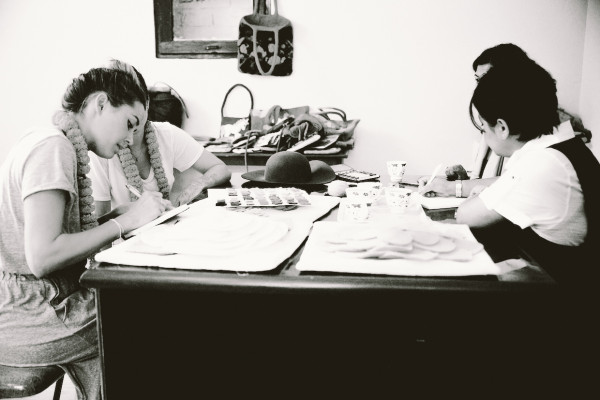
Each artisan group operates somewhat differently. At Destiny Reflections in Calcutta, India, the women rescued from sex trafficking are provided with food, shelter, training, and employment in the blockprinting workshop. The purchase of each handprinted apron, journal, and roll of wrapping paper represents a woman’s life completely transformed. At Artesania Sorata, 150 indigenous Bolivian women work from their homes and their hand knit alpaca baby mittens and booties provide income that sustains their families while the artisan group offers adult literacy classes, family healthcare, and workshops for the artisans.
Q | What do you love about working with Artisans from Bolivia, Ghana, India, Nepal, and more?
When we travel, meeting with the artisans in their homes and workshops, all of the data and statistics about their communities fall away and suddenly you discover the faces, names, and stories that give context to each object. For example, in Puno, Peru, the women of Manuela Ramos who create the beautiful bunnies, bears, and other creatures continued to knit without a pause throughout our three-hour visit! The opportunity to meet their families, learn about their materials and techniques, and visit their communities is a dream for us.
To be able to work with women who continue on with hope despite living with hardships from extreme poverty to unimaginable trauma moves us to do as much as we can to bring their handcrafted goods to customers. We measure success in the opportunity to make a difference in the lives of women and their families, who leave us at humbled and eager to do more to connect artisans groups with markets. We are inspired by the artisans – their skills passed down across the generations, the treasures they craft one-at-a-time, and their delight in bringing much needed income to their families with their talents – and hope that each visitor to thelittlemarket.com will be inspired as well.
Q | After you head home from an overseas trips, what are some things you take with you?
In planning our travels we begin with the artisan groups. On the spring trip to Guatemala, for example, we met with seven artisan groups, specializing in weaving textiles and crafting bracelets. When we visit the homes and workshops of the artisans we have the experience of handling the tools (for example the wooden blocks used to blockprint wrapping paper and aprons), seeing the selection of materials (yarns, trims, textiles, beads, etc.) up close, and learning about how the artisans create their works (attempting to use a hand loom). Each artisan group sends us home with samples, from overnight bags handwoven in Guatemala to the satchels handcrafted in New Delhi. Back home in L.A. we may request a redesign or we may ship back another product to inspire their work on a new concept. Once we confirm that the sample shape, size, color, etc. are just right for the customers, we place an order. As soon as the product is in stock all of the information about the item, the artisan group, and their country is posted on the website
.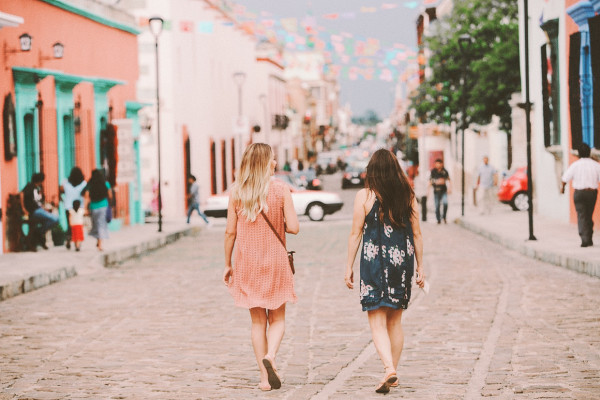
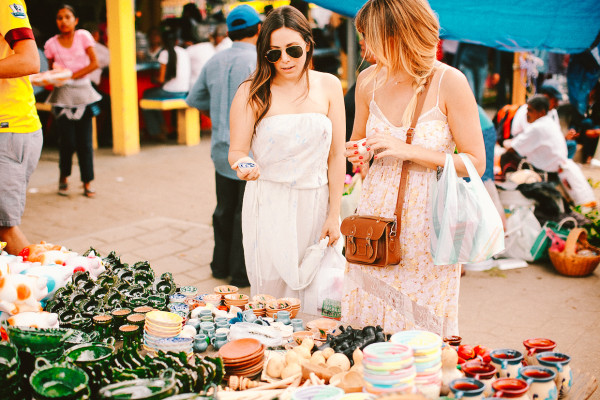
Q | What are some of the best practices when it comes to running The Little Market? Can you provide any advice to our readers who want to pursue a similar social enterprise.
The Little Market seeks out artisan groups that are committed to these key values: fair wages, workplace safety, and the well being of community families. Each artisan must receive a living wage, each workshop or factory must adhere to safety standards, and each artisan group must – in addition to wages – provide services in the areas of training, health, home improvements, and/or education.
One piece of advice that we would pass along is the critical role of connecting with others who share our passion for supporting artisans around the world. We discover new artisan groups through our customers, our colleagues, and visitors to the website blog from all over the world. We appreciate all of the input and the opportunities created to work with an ever-growing number of artisan groups.
Q | Any future projects coming up?
As we enter our second year, we will be working with the artisan groups in 13 countries to develop additional seasonal products, such as felt ornaments and garlands for winter from Friends Handicrafts in Nepal and hand-knit beanies and mittens for children and adults.
We’re also excited about a new artisan group we’re collaborating with called Prosperity Candles. They are our first U.S.-based artisan partner, operating out of Easthampton, Massachusetts. We are currently working with them to develop candles hand poured by Burmese refugees that will be available exclusively on The Little Market’s website this fall.
Q | We recently launched Conscious LA and grew close to the culture of California. We know you currently live in California, what do you love most about the culture?
California is incredibly diverse across countries of origin, languages, faiths, and cultures, which makes for a rich environment. Californians are very open to experiences from around the world, whether cuisine, music and dance, or holiday celebrations. We also share a deep appreciation for the outdoors, from shopping at the farmer’s market, to breathtaking hikes along the coast.
Q | We’re excited that you’ll be launching a column here on consciousmagazine.co. Why is that important to you?
We love that Conscious Magazine is dedicated to creating a community to identify global problems, discuss innovative solutions, and make a difference. At The Little Market we have found that it is possible to help artisans to help themselves, addressing problems related to poverty with the technology of a website serving as a global marketplace. We are excited to collaborate with Conscious Magazine to work towards our common goals. Each act of caring for others—locally or globally, family or strangers—has a powerful impact on repairing some of the brokenness of the world.
Learn + Connect
Discover more when you visit thelittlemarket.com
Connect via Facebook, Twitter, and Instagram
From the Editor
At Conscious, we are inspired by stories that cause us to think differently and think big-picture and so we set out to tell stories with the help of leaders and influencers in the social good community. You can read more stories like this when you Sign-up for the Weekly and Subscribe to Conscious Magazine.

